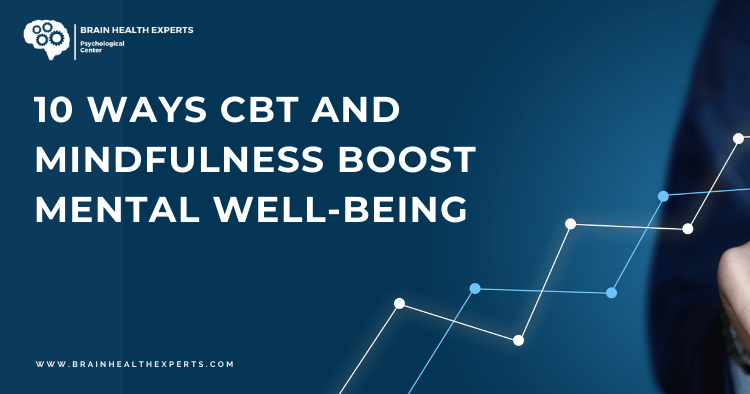Table of Contents
- Introduction
- Understanding CBT and Mindfulness
- 1. Enhancing Self-Awareness
- 2. Reducing Anxiety
- 3. Improving Emotional Regulation
- 4. Cultivating Resilience
- 5. Promoting Positive Thinking
- 6. Encouraging Acceptance
- 7. Increasing Focus and Concentration
- 8. Strengthening Relationships
- 9. Supporting Healthy Coping Mechanisms
- 10. Fostering a Sense of Purpose
- Conclusion
- FAQs
Introduction
Mental well-being remains a priority in our increasingly demanding world. As stressors from various aspects of life escalate, effective strategies for managing mental health become essential. Cognitive Behavioral Therapy (CBT) and mindfulness practices are two approaches that have shown significant promise in enhancing mental well-being. This article explores ten ways these methodologies can help you thrive in 2024 and beyond.
Understanding CBT and Mindfulness
Cognitive Behavioral Therapy (CBT) is a structured psychotherapy focused on altering unhelpful thought patterns and behaviors to improve emotional regulation and foster personal coping strategies. Mindfulness, on the other hand, emphasizes being present and fully engaged with your thoughts, emotions, and surroundings without judgment.
Integrating both practices creates a robust toolkit for mental wellness.
“Combining CBT and mindfulness offers a holistic approach to understanding and managing mental health.”
1. Enhancing Self-Awareness
Self-awareness is foundational to emotional intelligence, leading to improved decision-making and relationships. CBT encourages the identification and challenge of negative thought patterns, while mindfulness promotes an awareness of your current feelings and thoughts.
Benefits:
- Increased understanding of triggers
- Better management of emotional responses
Tip: Start a daily journaling practice to reflect on your thoughts and feelings. For additional self-awareness techniques, visit 10 Tips to Overcome Negative Thought Patterns Today.
“Self-awareness is the first step to emotional intelligence; embrace it!”
2. Reducing Anxiety
Anxiety often arises from negative thought patterns and excessive worry about the future. CBT offers strategies to identify and challenge these thoughts, while mindfulness teaches focusing on the present, thus reducing anxiety about potential future events.
Benefits:
- Lower levels of stress hormones
- Greater sense of calm and control
Resource: For more information on anxiety management through CBT, check out 10 Effective Stress Management Techniques for Daily Relief.
“Focusing on the present can free you from the anxieties of tomorrow.”
3. Improving Emotional Regulation
Emotional regulation involves managing and responding to emotional experiences healthily. CBT helps reframe negative thoughts, while mindfulness allows for the observation of emotions without immediate reaction.
Benefits:
- Decreased impulsivity
- Enhanced ability to cope with difficult emotions
Tip: Practice deep breathing exercises when feeling overwhelmed to regain control over your emotional state. For more techniques, see 10 Effective Emotional Regulation Techniques for Daily Life.
“Emotional regulation is key to a balanced life; take a moment to breathe.”
4. Cultivating Resilience
Resilience is the ability to bounce back from setbacks. CBT trains you to view challenges as growth opportunities, while mindfulness develops patience and acceptance during tough times.
Benefits:
- Increased adaptability to change
- Greater perseverance through challenges
Resource: Learn more about resilience-building strategies on 10 Effective Strategies for Building Resilience in Mental Health.
“Challenges are merely stepping stones to resilience.”
5. Promoting Positive Thinking
Both CBT and mindfulness emphasize shifting your mindset toward positivity. CBT teaches you to challenge negative thoughts, while mindfulness fosters an appreciation for the present, enhancing gratitude and optimism.
Benefits:
- Improved mood
- Enhanced overall life satisfaction
Tip: Start a gratitude journal and write down three things you are thankful for each day. For more positive thinking exercises, visit 10 Positive Thinking Exercises to Boost Mental Health.
“A positive mindset can change your entire day; practice gratitude.”
6. Encouraging Acceptance
Acceptance is a fundamental principle in mindfulness. It teaches you to accept your thoughts and feelings without judgment. CBT complements this by helping you understand that not all thoughts are facts, which promotes a healthier relationship with your mental processes.
Benefits:
- Reduced feelings of guilt and shame
- Greater peace of mind
Resource: For techniques on acceptance, check out 10 Ways Positive Thinking Boosts Emotional Well-Being.
“Acceptance is not resignation; it’s recognizing the present moment.”
7. Increasing Focus and Concentration
Mindfulness practices, such as meditation, train your brain to focus on the present. CBT helps eliminate distractions by addressing underlying thought patterns that lead to a lack of focus.
Benefits:
- Enhanced productivity
- Improved performance in daily tasks
Tip: Incorporate short mindfulness breaks into your workday to refresh your focus. For more on mindfulness, see 10 Mindfulness Practices to Boost Workplace Well-Being.
“Mindfulness is a tool for sharpening your focus; make it part of your routine.”
8. Strengthening Relationships
Better emotional regulation and self-awareness lead to healthier relationships. CBT enhances communication skills, while mindfulness nurtures empathy and understanding of others’ perspectives.
Benefits:
- Increased trust and connection
- Reduced conflicts
Resource: Explore more about building healthy relationships on 10 Ways Positive Thinking Transforms Your Relationships.
“Stronger relationships are built on understanding and empathy; cultivate both.”
9. Supporting Healthy Coping Mechanisms
In times of stress, having healthy coping strategies is essential. CBT offers practical tools for managing stress, while mindfulness encourages a non-reactive approach to difficult situations.
Benefits:
- Increased resilience in stressful situations
- Decreased reliance on unhealthy coping strategies
Tip: Experiment with various coping techniques, such as exercise or creative hobbies. For more stress management strategies, visit 10 Proven Stress Management Techniques for Daily Relief.
“Healthy coping strategies are your armor against stress.”
10. Fostering a Sense of Purpose
Both CBT and mindfulness can help you explore your values and what gives your life meaning. CBT can assist in identifying cognitive barriers to pursuing your goals, while mindfulness encourages appreciation for the journey itself.
Benefits:
- Increased motivation
- Greater fulfillment in daily activities
Resource: For guidance on finding purpose, visit 10 Ways Positive Thinking Fuels Personal Growth Journey.
“Finding purpose fuels your journey; embrace the exploration.”
Conclusion
Incorporating CBT and mindfulness into your daily routine can yield profound benefits for your mental well-being. By enhancing self-awareness, reducing anxiety, and promoting resilience, you can cultivate a more fulfilling and balanced life. Start your journey toward better mental health today!
FAQs
Q1: Can I practice CBT and mindfulness on my own?
Yes! Many resources, including apps and books, offer guidance on self-directed CBT and mindfulness practices. However, consulting a professional for personalized support is advisable.
Q2: How long does it take to see results from CBT and mindfulness?
Results vary; some may notice improvements within weeks, while others may take longer. Consistency is key!
Q3: Do I need to have a mental health condition to benefit from CBT and mindfulness?
Not at all! These practices can enhance overall mental well-being, even for those without diagnosed conditions.
“Your mental health journey is personal; take it at your own pace.”
By integrating CBT and mindfulness into your lifestyle, you’re taking significant steps toward improving your mental health. Happy practicing!





